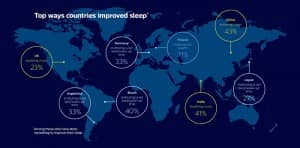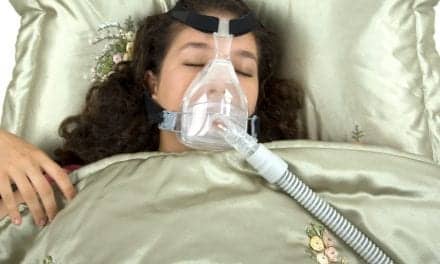Royal Philips has released the findings from its annual global survey in the report, “Better Sleep, Better Health. A Global Look at Why We’re Still Falling Short on Sleep,” which looked at what keeps people in 13 countries from getting their optimal night’s rest. Philips aims to use these findings to further enhance conversation about an important yet often forgotten pillar of health and wellbeing: sleep health.
What’s more, Philips was a secondary sponsor for an overnight sleep experience held in Austin on March 12 (and pictured above), in advance of World Sleep Day, which was March 16.
Annual Sleep Survey
Results from Philips’ annual sleep survey showed that globally, 77% of adults have tried to improve their sleep in some way, and 36% of adults across the globe have tried listening to soothing music to improve their sleep (an insight put to the test at the sleep experience in Austin). The survey, conducted online in February by Harris Poll on behalf of Philips, reviews the sleep habits of over 15,000 adults across 13 countries (United States, the UK, Germany, Poland, France, India, China, Australia, Colombia, Argentina, Mexico, Brazil, and Japan), taking a closer look at how sleep is prioritized, addressed, and perceived by populations around the globe.
Key findings include:
- We still aren’t prioritizing sleep: Looking at 13 countries, the survey found that the majority of global adults (67%) view sleep’s impact on their overall health and wellbeing to be significant. However, when it came down to incorporating healthy sleep habits into their lifestyle, the guilt felt for not regularly (ie, 3-4 times a week) exercising (49%) or not eating healthy (42%) far surpassed the guilt associated with not maintaining good sleep habits (29%).
- We face barriers to good sleep—and impacts from bad sleep: Over 6 in 10 global adults (61%) have some kind of medical issue that impacts their sleep, with a quarter of adults reporting insomnia (26%) and 1 in 5 experiencing snoring (21%). Worrying has kept over half of global adults up at night in the past 3 months (58%), followed by technology distractions (26%), and after a bad night’s sleep, global adults report they look tired (46%), they are moody/irritable (41%), they aren’t as motivated (39%), or they have trouble concentrating (39%).
- We’re willing to make an effort: Globally, three-quarters of adults (77%) have tried to improve their sleep in some way. Collectively, many have turned to soothing music (36%) or instituting a set bedtime/wake-up schedule (32%), however, different countries have tried different methods more so than other countries. One of the top methods Indian adults have turned to is meditation (45%), while one of the top methods used by Polish and Chinese adults is improving their air quality (33% and 31%), and many Mexican, Indian, and Chinese adults have tried specialized bedding (24%, 24%, and 31%).
• Millennials think differently about sleep: Throughout the global results, one outlier presented itself in adults ages 18 – 24. Despite being less likely to follow a set bedtime compared to other generations (38% vs 47% of those ages 25+), this group reported getting more sleep each night, on average, than other age groups (ages 18-24 get an average of 7.2 hours, compared to 6.9 hours among those ages 25+). They are also more likely to feel guilty about not regularly maintaining good sleep habits as compared to those ages 35+ (35% vs. 26%). Adults ages 18 -24 are also most likely to have done something in order to improve their sleep compared to those ages 25+ (86% vs 75%).
“Sleep is the cornerstone of a healthy lifestyle. On a day to day basis, how well and how long we slept the night before is the single most important variable dictating how we feel,” says David White, MD, chief medical officer, Philips Sleep & Respiratory Care, in a release. “Thus inadequate sleep can have an immediate impact on our wellbeing unlike exercise or diet. This survey shows that despite knowing sleep is important to overall health, people are still struggling to address it in the same way they would exercise or nutrition. The more we understand how sleep impacts everything we do, the better we can adjust our lifestyle and find solutions that help us get better sleep.”
Overnight Sleep Experience with Max Richter
Philips also was a secondary sponsor for the immersive, overnight sleep experience performed by critically acclaimed, international composer Max Richter at SXSW in Austin, Texas, on March 12. The concert, which began at midnight and ran until 8:30 am on March 13, saw Richter and a string ensemble perform the entire 8-hour lullaby that was composed to aid relaxation, meditation and sleep. Having previously performed Sleep in Australia, the UK, Germany, the Netherlands, Switzerland and Spain, the concert at SXSW was Richter’s North American debut.
To further amplify their message, Philips brought together influencers from all over the world in the days before the concert, asking “what happens when you don’t get enough sleep?” The international group of strangers went on tour from Los Angeles to Austin, completing sleep-related challenges and sharing their views on sleep, while learning the ways that Philips is committed to making life better by empowering the world to get a good night’s sleep along the way. The tour culminated at SXSW.







Looks like there’s still a lot of work to be done in educating the public and Internal Medicine positions on the importance of a healthy night’s sleep. I live in a community where family doctors count on specialists to screen for sleep apnea. This practice seems to be opposite of what it should be…. And over the last 5 years in particular I’ve seen many people go untested and untreated.
This is great insight to postulate solutions. I don’t believe it will be one or two solutions solving 75% of the issues. This is going to be partly current social and job type interactions effect mental intensity as well as physical impacts introduced via therapy. We need to promote innovation that is easily modified with user preferences being able to interact with the therapy. Different locations around the world value and are impacted by different variations of the root cause. In short, “think out of the box” and reward innovation”.
Is there a way I can take a look at the questionnaire use for the survey??